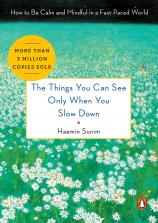Excerpt
Excerpt
The Things You Can See Only When You Slow Down: How to Be Calm and Mindful in a Fast-Paced World

Why Am I So Busy?
When everything around me is moving so fast, I stop and ask,
“Is it the world that’s busy, or is it my mind?”
We usually think of “mind” and “world” existing independently of each other. If someone asks where our mind is, most of us would point to either our head or our heart, but not to a tree or the sky. We perceive a clear boundary between what goes on inside our minds and what happens in the outside world. Compared to the vast world outside, the mind nestled inside the body can feel small, vulnerable, and sometimes powerless. According to the Buddha’s teaching, however, the boundary between the mind and the world is actually thin, porous, and ultimately illusory. It is not that the world is objectively joyful or sad and produces a corresponding feeling in us. Rather, feelings originate with the mind projecting its subjective experience onto the world. The world isn’t inherently joyful or sad; it just is.
Perhaps we can better understand this through a conversation I had with a dear friend of mine, a responsible and meticulous Buddhist nun. She recently oversaw the construction of a meditation hall in her temple. After relating the ordeal of obtaining various permits and finding the right contractor, among other things, she described the construction process in the following way:
“When it came time to place tiles on the roof, I saw tiles everywhere I went. I noticed the material they were made of, their thickness, their design. And then, when it was time to install the floor, all I could see were floors. I naturally zeroed in on the color, origin, pattern, and durability of a hardwood floor. And then it suddenly dawned on me: When we look at the outside world, we are looking at only a small part that interests us. The world we see is not the entire universe but a limited one that the mind cares about. However, to our minds, that small world is the entire universe. Our reality is not the infinitely stretching cosmos but the small part we choose to focus on. Reality exists because our minds exist. Without the mind, there would be no universe.”
The more I reflected on this, the more her insight made sense to me. The world comes to exist because we are aware of it. We cannot live in a reality of which we are unaware. The world depends on our minds in order to exist, just as our minds depend on the world as the subject of our awareness. Put differently, our mind’s awareness can be said to bring the world into being. What our mind focuses on becomes our world. Seen this way, the mind does not seem so insignificant in relation to the world out there, does it?
We neither can nor want to know every single thing that happens in the world. If we did, we would go crazy from the overload of information. If we look at the world through the lens of our mind, the way my friend did, we will readily notice what we are looking for, because our mind will focus on it. Given that the world we see through our mind’s eye is limited, if we can train our mind and choose wisely where to focus, then we will be able to experience the world corresponding to the state of our mind.
As a monk and a college professor, I am pulled in many different directions. During the week I teach and conduct research, and on the weekend I drive a couple hours to assume duties at my teacher’s temple. During school breaks, my schedule becomes even busier. I need to visit senior monks, serve as an interpreter for monks who don’t speak English, go to different temples to give Dharma talks, and carve out time for my own meditation practice. On top of that, I continue to research and write academic papers.
To be honest, I sometimes wonder whether a Zen monk should keep to such a full schedule. But then I realize it isn’t the outside world that is a whirlwind; it is only my mind. The world has never complained about how busy it is. As I look deeper into myself to see why I am living such a busy life, I realize that, to a certain extent, I actually enjoy being busy. If I truly wanted to rest, I could decline invitations to teach. But I have welcomed such requests because I enjoy meeting people who want my advice and helping them with what little wisdom I have. Seeing other people happy is a deep source of joy in my life.
There is a famous Buddhist saying that everyone appears as buddhas in the eyes of the Buddha and everyone appears as pigs in the eyes of a pig. It suggests that the world is experienced according to the state of one’s mind. When your mind is joyful and compassionate, the world is, too. When your mind is filled with negative thoughts, the world appears negative, too. When you feel overwhelmed and busy, remember that you are not powerless. When your mind rests, the world also rests.
*
We know the world only through the window of our mind.
When our mind is noisy, the world is as well.
And when our mind is peaceful, the world is, too.
Therefore, knowing our minds is
just as important as trying to change the world.
*
I squeeze myself into the subway car.
People are crowded all around me.
I can either get annoyed
or think it’s fun that I don’t have to grab a handrail.
People react differently to the same situation.
If we look at it more closely,
we see it’s not the situation that is troubling us,
but our perspective on it.
*
Tsunamis are frightening not just because of the water,
but also because of the objects hurled at us by the water.
Tornadoes are terrifying not just because of the wind,
but also because of the objects uprooted and thrown by the wind.
We feel unhappy not just because something bad has happened,
but also because of the swirling thoughts about what happened.
*
When you have an unpleasant feeling,
don’t grab hold of it and turn it over and over.
Instead, leave it alone so it can flow.
The wave of emotion will naturally recede on its own
as long as you don’t feed it by dwelling on it.
*
To get food unstuck from a frying pan,
just pour water in the pan and wait.
After a while the food loosens on its own.
Don’t struggle to heal your wounds.
Just pour time into your heart and wait.
When your wounds are ready,
they will heal on their own.
*
If we know how to be content,
we can relax our endless striving and welcome serenity.
If we know how to be content,
we can enjoy the time we have with the person next to us.
If we know how to be content,
we can make peace with our past and let go of our baggage.
*
If you’ve been unable to change a bad situation, even after many attempts,
you should change how you look at the situation.
Nothing is intrinsically good or bad.
Good or bad is always relative.
Compare your situation with someone’s that is worse.
Now yours does not seem so bad after all.
*
When you are stressed out, be aware of your stress.
When you are irritated, be aware of your irritation.
When you are angry, be aware of your anger.
As soon as you become aware of these feelings
you are no longer lost in them.
Your awareness allows you to witness them from the outside.
Awareness is inherently pure, like the open sky.
Stress, irritation, and anger can temporarily cloud the sky,
but they can never pollute it.
Negative emotions come and go like clouds,
but the wide-open sky remains.
*
Like toxins slowly filling our bodies,
if anger, despair, or sorrow accumulate in our hearts,
we have to do something about it.
Exercise, talk to your mentor, meditate on loving-kindness.
As we begin to make the effort, the toxins start to lose their grip.
*
Do memories cause you pain?
Practice being in the present moment.
Turn your attention to the here and now.
Notice that your thoughts subside when you focus on the present.
As your thoughts quiet, so, too, the memories.
Because memories are, in essence, thoughts.
*
When you leave work for the day,
if you find yourself asking,
“Do I have to live my whole life like this?”
Then try the following:
Wake up a little earlier the next morning,
and sit in silence, as if in meditation.
Breathe in deeply and slowly,
and ask yourself how your work is helping others,
regardless of how insignificantly or indirectly.
As you focus more on others,
you can reconnect with the meaning and purpose of your work.
*
A very modern dilemma:
There are countless television channels
but nothing interesting to watch.
Too many choices make people unhappy.
*
Are you feeling confused or conflicted?
Allow yourself a good night’s sleep.
When you wake up the next day, the problem will seem lighter.
It works, truly.
*
If you would like to sleep more peacefully,
as you lay your head on your pillow,
think of the people whom you are grateful to,
or the times you helped others and felt good about yourself.
It will warm your heart, gifting you with more peaceful sleep.
*
With love in our hearts,
we find even the most mundane things sacred and beautiful.
With love in our hearts,
we become kinder and gentler, even to complete strangers.
Without love in our hearts,
we find the world meaningless and random.
Without love in our hearts,
we become strangers even to our family and friends.
*
When we are open to others,
we dare to be vulnerable and honest.
When we have goodwill toward others,
we intend to be happy and connected.
Close your eyes, take a deep breath, and say,
“May my friends and acquaintances be loved and protected!”
With those words, you, too, will feel loved and protected.
*
When we are comfortable with ourselves
and have accepted ourselves wholly,
others will find us approachable
and will like us for who we are.
*
I wish you could see my true nature.
Beyond my body and labels,
there is a river of tenderness and vulnerability.
Beyond stereotypes and assumptions,
there is a valley of openness and authenticity.
Beyond memory and ego,
there is an ocean of awareness and compassion.
*
The wise do not fight the world.
In the most relaxed and playful manner,
they simply embody the truth that they are one with it.
The Things You Can See Only When You Slow Down: How to Be Calm and Mindful in a Fast-Paced World
- Genres: Nonfiction, Spiritual Growth, Spirituality
- hardcover: 288 pages
- Publisher: Penguin Books
- ISBN-10: 0143130773
- ISBN-13: 9780143130772



